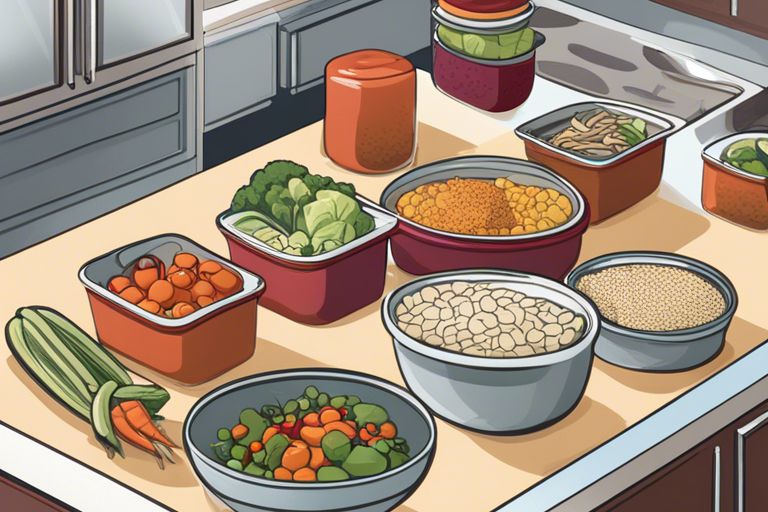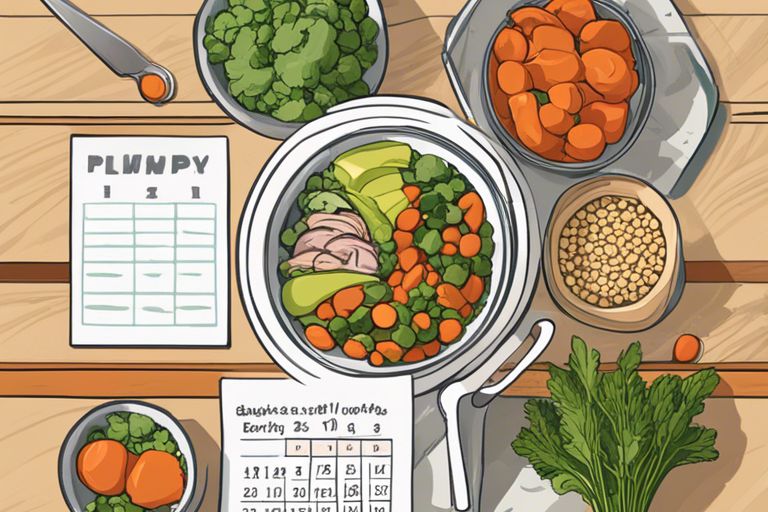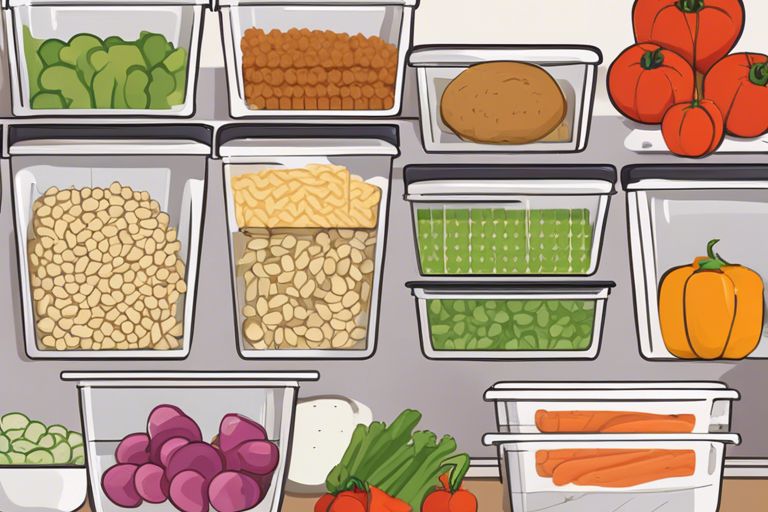This guide aims to enlighten individuals on the importance of strategic meal planning to navigate the challenges of busy lifestyles. In a world where time is a luxury, adopting efficient meal planning techniques can significantly impact health and productivity. By utilizing our time-saving strategies and nutrient-rich recipes, readers will be equipped to conquer their daily routines without compromising on balanced nutrition.
Key Takeaways:
- Efficiency: Meal planning helps save time and energy by organizing meals in advance, ensuring quick and easy cooking during busy weekdays.
- Healthy Choices: Planning meals allows for better nutrition control, ensuring balanced and healthy eating habits in spite of a hectic schedule.
- Cost-Effective: By meal planning, individuals can reduce food waste, make smarter grocery purchases, and save money in the long run.

The Philosophy of Meal Planning
Meal planning is not just a mundane task of deciding what to eat each day; it is a strategic approach to nourishing our bodies while managing the chaos of modern life. By understanding the philosophy behind meal planning, we can transform it from a stressful chore into a powerful tool for optimizing our health and well-being.
Time Management and the Theory of Relativity in the Kitchen
Planning is the key to successful meal preparation. In the realm of culinary creation, time is a precious resource that must be managed wisely. Just as Einstein’s theory of relativity posits the interconnectedness of time and space, so too must we acknowledge the correlation between time management and the efficiency of our meal planning endeavors. By carefully scheduling our shopping, prepping, and cooking activities, we can make the most of our time in the kitchen and ensure that nutritious meals are always within reach.
Evolutionary Perspectives on Dietary Choices
Kitchen is not just a place where we cook; it is a laboratory where the principles of evolutionary biology come to life. Our dietary choices are shaped by millennia of adaptation to our environment, with our bodies finely tuned to crave foods that would have sustained our ancestors. By embracing this evolutionary perspective, we can make more informed decisions about what to put on our plates, honoring the wisdom of our genetic heritage.
Theory In the context of modern abundance, it is easy to stray from our evolutionary roots and indulge in processed foods that offer instant gratification but little nutritional value. However, by recognizing the evolutionary significance of our dietary choices, we can align our meal planning with the needs of our bodies, promoting health and vitality for the long term.
Strategies for the Chronometrically Challenged
Now, in the fast-paced world we live in, finding time for meal planning and preparation can be a challenge for many individuals. But fear not, for there are strategies that can help even the most time-strapped individuals to eat healthy and delicious meals without sacrificing precious minutes in their day.
Calendar-Centric Cuisine: Making the Most of Your Meal Times
CalendarCentric planning involves syncing your meal times with your daily schedule. By assigning specific times for meals on your calendar, you can ensure that you prioritize your nutrition and avoid skipping meals due to a busy schedule. This method also allows you to plan ahead and prep meals in advance, making it easier to stick to your meal plan even on hectic days.
For those with jam-packed schedules, it can be beneficial to set reminders on your phone or computer for meal times. This will help you stay on track and avoid missing out on essential nutrients. By making your meal times a priority in your daily schedule, you can optimize your energy levels and improve your overall health.
Culinary Shortcuts Through Space-Time: Quick and Healthy Recipes
Through space-time culinary shortcuts, you can whip up nutritious meals in a fraction of the time. Opt for quick and healthy recipes that require minimal ingredients and prep time. One-pot meals, sheet pan dinners, and batch cooking are great options for those with limited time but a desire for wholesome meals.
With these culinary shortcuts, you can save time in the kitchen while still enjoying delicious and nutritious meals. Consider investing in kitchen gadgets like a pressure cooker or slow cooker to further streamline your cooking process. By utilizing these time-saving tools, you can effortlessly incorporate healthy eating into your busy lifestyle.

Mastering the Art of Grocery Shopping
After laying the groundwork for effective meal planning, the next step is mastering the art of grocery shopping. This crucial step can make or break your meal planning efforts, impacting your time, budget, and ultimately the success of your meal prep.
The Hawking Guide to Streamlining Your Shopping List
Shopping for groceries can be overwhelming, especially when trying to stick to a meal plan. To streamline your shopping list and optimize your time at the store, start by creating a detailed list based on your meal plan. Make sure to include all the ingredients you need for your planned meals, as well as any household staples that are running low. This will help you stay focused and avoid wandering aimlessly through the aisles.
Another tip from the Hawking guide is to organize your list based on the layout of the store. Group items together by section (e.g., produce, dairy, pantry) to minimize backtracking and wasted time. This strategic approach will help you navigate the store efficiently and get in and out in record time.
Neutrino-Like Efficiency: Learning to Navigate the Aisles Faster Than Light
Your shopping experience can reach a whole new level of efficiency by learning to navigate the aisles faster than light. This means moving through the store with precision and speed, avoiding distractions and unnecessary detours. By honing your grocery shopping skills, you can significantly reduce the time spent at the store and make the process more enjoyable.
Mastering the art of grocery shopping is not just about getting in and out quickly but also about making informed choices. Take the time to compare prices, read labels, and choose products that align with your meal plan and dietary preferences. By combining speed with mindfulness, you can become a true master of the grocery store, optimizing both your time and budget.
High-Energy Eating
Fuelling the Body-Mind Continuum: Nutritional Density Considerations
For individuals with busy lifestyles, it’s essential to prioritize high-energy eating to sustain both the body and mind throughout the day. When meal planning, it’s crucial to consider the nutritional density of the foods consumed. Opting for foods rich in essential nutrients such as vitamins, minerals, and antioxidants can provide the sustained energy needed to stay sharp and focused.
By incorporating a variety of fruits, vegetables, whole grains, and lean proteins into your meals, you can ensure that you are fueling your body-mind continuum with the necessary building blocks for optimal performance. Choosing nutrient-dense options not only boosts energy levels but also supports overall health and well-being.
The Dawkins Diet: Selecting Foods for Survival and Success
One of the key principles of the Dawkins Diet is selecting foods that contribute to survival and success. This approach emphasizes the importance of consuming foods that are not only high in energy but also rich in essential nutrients. By focusing on whole, unprocessed foods, individuals can support their physical and mental stamina while enhancing their overall quality of life.
Foods that are included in the Dawkins Diet are those that are rich in complex carbohydrates, healthy fats, and protein. These foods provide a steady source of energy, support cognitive function, and help maintain a healthy weight. By prioritizing nutrient-dense options, individuals can optimize their performance in all areas of life.
Foods included in the Dawkins Diet are carefully selected based on their ability to promote longevity, mental clarity, and overall well-being. This approach to high-energy eating is rooted in the belief that the fuel we put into our bodies directly impacts our ability to thrive and succeed. By choosing foods that nourish both the body and mind, individuals can unlock their full potential and live a life of vitality and purpose.
Sustaining Your System
Despite our best efforts in meal planning, we often find ourselves faced with the challenge of sustaining our system. This involves not only efficiently using the ingredients we’ve purchased but also managing the leftovers to minimize waste and ensure that our meals remain nutritious and enjoyable.
The Entropy of Leftovers: Understanding Food’s Lifecycle
An inevitable consequence of meal preparation is the generation of leftovers. These remnants of meals past can quickly accumulate in our refrigerators, only to be forgotten and eventually thrown away. It’s important to recognize that food has a lifecycle, and allowing leftovers to go to waste not only squanders resources but also contributes to environmental degradation through increased methane emissions in landfills.
Understanding the entropy of leftovers means becoming aware of the lifespan of our food and finding creative ways to reincorporate them into our meals. By repurposing leftovers, we can reduce our overall food waste and develop a more sustainable approach to meal planning.
Conservation of Flavor: Tips for Repurposing Meals
Sustaining the flavor of our meals requires creative strategies for repurposing leftovers. By transforming yesterday’s dish into today’s culinary masterpiece, we not only minimize waste but also maximize nutritional value and taste. Here are a few tips to help you conserve flavor and make the most of your leftovers:
- Experiment with different seasonings and spices to give leftovers a fresh twist.
- Combine ingredients to create new dishes like salads, soups, or wraps.
- Freeze leftovers for future use in casseroles or stir-fries.
Assume that every leftover has the potential to be transformed into a delicious and satisfying meal.
Sustaining the flavor and quality of our meals through the conservation of leftovers is not only a practical approach but also a sustainable one. By adopting a mindset of creativity and resourcefulness in the kitchen, we can minimize food waste and contribute to a more environmentally-conscious lifestyle. Assume that every leftover has the potential to be transformed into a delicious and satisfying meal.
Summing up
With these considerations in mind, it is evident that meal planning is key to maintaining a healthy diet and lifestyle, especially in today’s fast-paced world. By taking the time to plan out meals ahead of time, individuals can ensure they are getting the nutrients they need while also saving time and stress during the week. Incorporating variety, balance, and convenience into meal plans can help individuals stay on track with their health goals and make better food choices. Overall, meal planning is a practical and effective strategy for busy individuals looking to prioritize their well-being and nutrition.
FAQ
Q: Why is meal planning important for busy lifestyles?
A: Meal planning is crucial for busy lifestyles as it helps individuals save time, money, and effort. By planning meals in advance, one can ensure they have nutritious and balanced meals ready to eat, reducing the temptation to opt for unhealthy fast food options.
Q: How can one effectively meal plan for a busy lifestyle?
A: To effectively meal plan for a busy lifestyle, one can start by creating a weekly menu, making a grocery list based on the menu, and dedicating a specific time for meal prep. It is also helpful to cook in batches and utilize storage containers for easy access to meals throughout the week.
Q: What are some quick and healthy meal ideas for busy individuals?
A: Some quick and healthy meal ideas for busy individuals include overnight oats for breakfast, salads with pre-cooked protein for lunch, and stir-fries for dinner. Snacks like fruit, nuts, and yogurt can also be prepared in advance for a quick and nutritious option on the go.

